Play (2012)
by Todd Kreidler
based on the screenplay of the 1967 film of the same name
by William Rose
Directed by David Esbjornson
Huntington Theatre Company
Boston University Theater
Symphony Hall area, Boston
September 5 – October 5, 2014
With Lynda Bravatt (Matilda Binks), Wendy Rich Stetson (Hilary St. George), Julia Duffy (Christina Drayton), Will Lyman (Matt Drayton), Meredith Forlenza (Joanna Drayton), Malcolm-Jamal Warner (Dr. John Prentice), Patrick Shea (Monsignor Ryan), Lonnie Farmer (John Prentice, Sr.), Adriane Lenox (Mary Prentice)
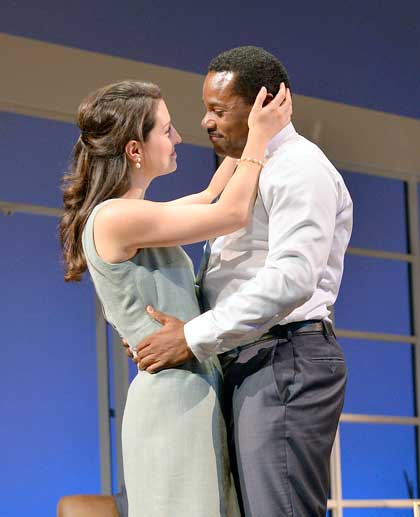
Malcolm-Jamal Warner as Dr. John Prentice
in “Guess Who’s Coming to Dinner”
Photo: Paul Marotta
Courtesy of Huntington Theatre Company
John Prentice (Malcolm-Jamal Warner) is a highly successful doctor, African-American, and Joanna Drayton (Meredith Forlenza) is a white woman with whom he falls in love. They come to Joanna’s parents’ house to announce their engagement and to seek their blessing. Along the way, John’s parents also figure into the revelations, as does a priest friend of the Drayton family, Monsignor Ryan, and Matilda, their African-American housekeeper.
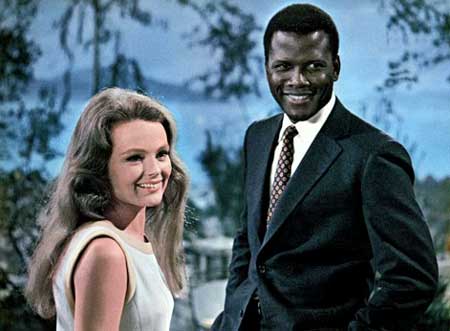
Sidney Poitier as Dr. John Prentice
in “Guess Who’s Coming to Dinner” (1967)
At the rise of the curtain, the production, set in 1967, does seem dated, and one begins to wonder why the Huntington chose to develop and to produce this play based on that great, now somewhat old, film now. As the play unfolds, the quality of the adaptation and of the production shine through vividly and, in the end, the collective effort results in a thoughtful and moving rendition that answers the initial question on its own.
The doctor, whose role was played by the inimitable Sidney Poitier in the film, is here addressed by Malcolm-Jamal Warner, who played Cliff and Claire Huxtable’s son Theo on TV’s The Cosby Show (1984-1992). He does a noble job of providing an alternative to the iconic Poitier performance and though not as regal and eloquent, gives a believable and heartfelt performance. Like Harry Potter‘s Daniel Radcliffe, also a very good actor, Warner has a lot on his shoulders to convince an audience that he can effectively play an adult. And, like Radcliffe, he rises to that occasion very well.
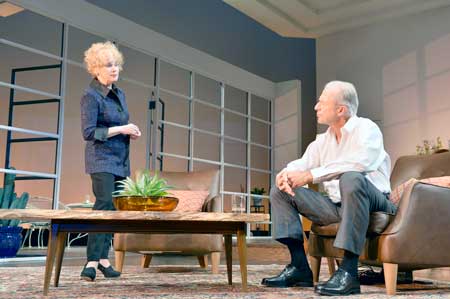
Will Lyman as Matt Drayton
in “Guess Who’s Coming to Dinner”
Photo: Paul Marotta
Courtesy of Huntington Theatre Company
There are other big shoes to fill.
In the film, Matt Drayton is played by Spencer Tracy, who apparently filmed the movie just shortly before he died. Nonetheless, Tracy’s performance is solid and remarkable, his final speech capping the film with rhetorical grandeur.
Here, the wonderful Will Lyman takes over that role with aplomb, as solid as Tracy but not quite as gruff, and eloquently delivering his final oration with a disarmingly potent effect. Lyman is a master of dramatic restraint, conveying in posture, demeanor and subtle gesture a universe of feeling within, a perfect match for this role in which personal reservation and public generosity fuse into an internally combustible mix.
The Katherine Hepburn role of Christina Drayton is here played by the spritely, but powerful, Julia Duffy, who gives a resonant performance without quite so much fanfare as Hepburn does, but with equal effect. When she tells her racist colleague to get packing, she does it with breathtaking panache.
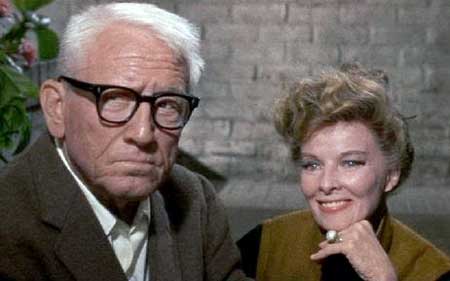
Katharine Hepburn as Christina Drayton
in “Guess Who’s Coming to Dinner” (1967)
I was really struck by how well the stage version was adapted from the film. Frankly, I had my doubts going into it and was pleasantly surprised to find that playwright Todd Kreidler had done an excellent job of distilling and reworking the filmscript in a way that really made it stageworthy.
As well, I was struck by what, I imagine, most of the audience which goes to see this show is struck by – how relevant and pertinent this now almost fifty year old script seems to be, once one settles into it and realizes what is going on. It’s magnificent to sit there and realize that these were the stark realities of a generation ago, quite strikingly different in some quarters today than they were then, and yet so close in so many ways to prejudicial patterns that persist that the combination of distance and proximity is particularly interesting and jarring.
I was just reading in the Boston Globe about the racial conflicts in Boston of forty years ago brought on by busing of children from black neighborhoods to schools in white neighborhoods. Though racism is not a thing of the past, realizing the intensity of what happened in Boston forty years ago makes this play considerably more relevant.
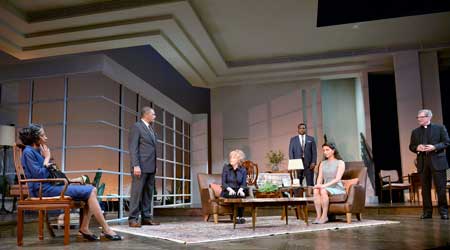
Lonnie Farmer as John Prentice, Sr.
Malcolm-Jamal Warner as Dr. John Prentice
Julia Duffy as Christina Drayton
Patrick Shea as Monsignor Ryan
Meredith Forlenza as Joanna Drayton
in “Guess Who’s Coming to Dinner”
Photo: Paul Marotta
Courtesy of Huntington Theatre Company
All the actors shine in this production.
In addition to those mentioned, Lynda Gravant as the black maid, Matilda Binks, is hilariously blunt, delivering her lines with perfect candor and wit.
Meredith Forlenza, as Joanna Drayton, the forthright daughter, has a tricky role but rises to it commendably, having to be knowing and unknowing at the same time, able to exhibit blind trust in her parents’ judgment while being subliminally prepared to defy them.
Patrick Shea as Monsignor Ryan is really hilarious and provides a great foil for Will Lyman’s Matt Drayton. The openness and casualness with which the two go at one another is very funny, appealing and appropriately tense when necessary. But the role, and Shea’s way of playing it, make for great comic departure.
As Dr. John Prentice’s parents, Lonnie Farmer (John Prentice, Sr.) and Adriane Lenox (Mary Prentice) are also great. They are basically speechless when they enter the stage and remain so for quite awhile, which only adds to the effect when they get to open their mouths. Farmer is great at holding a frown and a stubborn stance and he makes even this somewhat curmudgeonly part very funny when he gets a chance. Lenox is also silent for a long time but beautifully eloquent when she gets to have her piece. Playwright Todd Kreidler has been very adept at shaping things so that these tensions between silence and expression get their complementary due in an effective way.
This is a surprisingly entertaining and stirring production, a strikingly good adaptation of a filmscript and a poignant reflection on prejudice: of where we were, to where we’ve come, and about what we have yet to do.
– BADMan
Leave a Reply